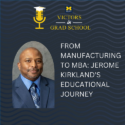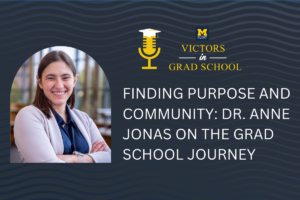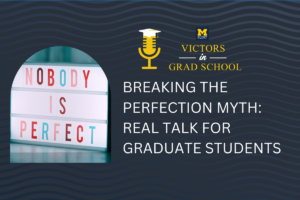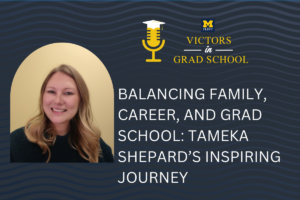
Graduate school is an ambitious trek that requires not only academic prowess but also exceptional determination and patience. Recently, I had the pleasure of speaking with Jerome Kirkland, a site manager at BASF and a graduate of the University of Michigan Flint, who shared his invaluable experiences and insights about his journey through graduate school. Our conversation highlighted key aspects of his academic and professional journey, which can serve as a beacon for anyone contemplating a similar path.
The Decision to Pursue Graduate Education
A Call to Higher Education
Jerome’s story is a testament to the power of mentorship and professional guidance. He reminisced about his initial decision to pursue a master’s degree, influenced heavily by his manager, who was a fervent advocate for education. “One of the days he came to me and he said, hey, Jerome, you know, we offer tuition reimbursement. Maybe you should look into that,” Jerome recalled. This gentle nudge from his manager played a pivotal role in his decision to enroll in an MBA program at the University of Michigan Flint.
Choosing the Right Program
When considering MBA programs, Jerome’s choice to stick with the University of Michigan Flint was driven by a combination of familiarity, comfort, and strong family ties. Despite living closer to the Ann Arbor campus, the Flint campus offered him the proximity to family and friends, making his academic journey a holistic experience. “I still have family there. At that time, I was living in Belleville, Michigan… but it gave me an opportunity to, you know, just come home, visit family and friends, and still have an opportunity to get a good education,” he shared.
The Graduate School Transition
Re-Engaging with Academia
Transitioning back into academic life after establishing oneself in the workforce can be challenging. Jerome emphasized the importance of time management, patience, and leveraging one’s foundational education to navigate the graduate school terrain successfully. “Graduate school is not for the faint of heart… You really have to dedicate time, you have to dedicate patience,” Jerome advised, highlighting the need for a disciplined approach.
Overcoming Challenges
Every academic journey comes with its unique set of challenges. For Jerome, the global COVID-19 pandemic became a backdrop for his graduate studies, presenting both difficulties and opportunities. Jerome used the increased focus and decreased distractions during the pandemic to his advantage. “I had a little bit more time to really just push myself towards getting that degree in graduate school.”
Key Learnings and Applications
Collaboration and Continuous Learning
One of Jerome’s major takeaways from his MBA program was the importance of collaboration. “If you’re the smartest person in the room… you need to find another room,” he said. This mindset has been instrumental in his professional life, where he continuously seeks diverse perspectives and teamwork to address complex challenges.
Practical Applications
Jerome’s experiences in graduate school, from financial analysis to operations management, have had a direct impact on his day-to-day job as a plant manager. He emphasized that the real-world case studies and hands-on learning in his MBA program have made his professional responsibilities more comprehensible and manageable.
Advice for Aspiring Graduate Students
Follow Your Passion
Jerome’s most crucial piece of advice for prospective graduate students is to pursue further education only if they are genuinely passionate about it. “You have to really say that this is what I want. You can’t do it for somebody else,” Jerome stressed. His journey underscores the importance of intrinsic motivation and personal commitment in achieving success.
In conclusion, Jerome Kirkland’s journey through graduate school offers a wealth of insights for anyone considering this path. His experience underscores the importance of mentorship, the right academic environment, disciplined time management, and the drive to overcome challenges. As Jerome aptly puts it, continuous learning and collaboration are keys to long-term success in both academia and professional life.
TRANSCRIPT
Christopher Lewis [00:00:01]:
Welcome to the victors in grad school, where we have conversations with students, alumni, and experts about what it takes to find success in graduate school.
Christopher Lewis [00:00:11]:
Welcome back to victors in grad school. I’m your host, doctor Christopher Lewis, director of graduate programs at the University of Michigan, Flint. Really excited to have you back again this week. You know, this week, as always, I’m here to walk with you, to help you, to work with you as you walk toward, walk through, and walk beyond graduate school. It’s really exciting to be able to be in this journey alongside you, to help you along the way, and I want you to be successful. So that’s why every week this podcast is here to be able to give you some tips, some tools, some things that you can take with you to help you on this journey that you’re on. Every week I try to bring you different guests with different experiences that have been able to go to graduate school, have been able to go to graduate school, be able to be successful in going through graduate school, and can share that experience with you. Today, I’ve got a great I’ve got a great new guest with us today and I’m really excited to be able to have him here.
Christopher Lewis [00:01:10]:
Jerome Kirkland is with us today. And Jerome is a site manager at BASF, and he’s been doing that for a number of years. But he did his undergraduate work at the University of Michigan Flint, and then went on and got his master’s of business administration at the University of Michigan Flint as well. So I’m really excited to be able to talk with him and have him share some of his experiences with you. Jerome, thanks so much for being here today. Thank
Jerome Kirkland [00:01:35]:
you so much for having me, Doctor. Lewis.
Christopher Lewis [00:01:37]:
It is my pleasure. Really excited to be able to talk to you. And I want to turn the clock back in time. I want to go all the way back to those days when you were on campus at the University of Michigan, Flint going through that bachelor of business administration degree in accounting and operations management. At some point during that time, you made a choice. You made a choice to continue your education. Bring me back to that point and talk to me about what was going through your head and what made you decide that graduate school was the right next step.
Jerome Kirkland [00:02:05]:
Well, if I go back to that time, I was working a lot in automotive. Being from the Flint area, you know, basically everything, manufacturing or any really good paying jobs at that time were in manufacturing. So I wanted to make sure that my education kinda took me to where I wanted to go. We all have aspirations when we’re either getting ready to go to undergrad or grad school on where do we see our careers being. I know one of the things that I wanted from my career was to at least be at a plan manager, director level, or somewhere along that stratosphere, And I knew in order to do that, I will have to do the work leading up to that. And one of those things was making sure that I got my bachelor’s in the end, pursued a master’s degree so that I could really see how to really effectively run a business.
Christopher Lewis [00:02:44]:
I mentioned that you did your undergraduate work at the University of Michigan Flint, and you probably could have gone to a lot of different places. You could have chosen to go to some other place for your master’s degree, but you chose to go to the to the master’s in business administration program at the University of Michigan Flint. Talk to me about what made you decide that the MBA was the right choice. And then secondly, as you were looking at MBA programs, what made you finally decide that U of M Flint was the place where you wanted to land?
Jerome Kirkland [00:03:12]:
Well, what made me really look at getting an MBA was I had a manager who really believed in, you know, education and and really doing those things to get yourself ahead in in organizations. And one of the days he came to me and he said, hey, Jerome, you know, we offer tuition reimbursement. And I said, really? He said, yeah. Maybe you should look into that. And, he said, we’ll talk about it on our next call. So that was kind of the gentle push. I believe I need it. I believe that manager at the time, who was our global manufacturing director, seen something in me where he’s seen that I could grow throughout our organization.
Jerome Kirkland [00:03:45]:
And he said, well, hey. You know, by the time we had the next call, I said, I looked into it, and one of the places that I think I really have a good fit is University of Michigan Flint. I still have family there. At that time, I was living in Belleville, Michigan, which was actually closer to the Ann Arbor campus, but it gave me an opportunity to, you know, just come home, visit family and friends, and still have an opportunity to get a good education.
Christopher Lewis [00:04:06]:
Now, anybody that goes through undergraduate work gets out into the workforce and then decides, Hey, I’m gonna go back. I’m gonna go back and get some education. You gotta get back into the mindset. You gotta transition back into school. And there is a transition that you go through when you go from being an undergraduate student to being a graduate student. So talk to me about that transition and what you had to do to be able to not only find success as you entered into the graduate degree, But what did you have to do to maintain that success throughout your graduate school experience?
Jerome Kirkland [00:04:42]:
I always tell people graduate school is not for the faint of heart. It’s a lot of work that you have to put in there. So you really have to dedicate time, you have to dedicate patience, and you kinda have to deal with your foundational education. I I think it was really important that I got a good education in my undergrad, and it helped push me and make me successful throughout grad school. I think the one thing I can say about University of Michigan Flint is the professors really are there to help you. They’re they’re to push you also. So it’s not like, you know, they’re just giving degrees away. It’s a lot of work that goes into it.
Jerome Kirkland [00:05:11]:
And once I realized the the time commitment that I would have to give to it, I I just kinda buckled down there and said, okay. This is what I’m gonna have to do to move forward. And then the second thing was just patience because, you know, with grad school, it’s it’s half the time of undergrad school. So you look at it as it’s it’s a it’s a more accelerated push of yourself, and it and it really pushes you to, you know, different limits. And then you still have your day to day life going on, whether you’re working or whether you’re a parent or whether you’re a spouse. So all of those things combined, it just you know, it it put me in a place where it pushed me to be the best version of myself.
Christopher Lewis [00:05:46]:
Now going through graduate school is not always roses. It’s there’s definitely challenges along the way. Talk to me about some of those hills that you had to climb and what you had to do to be able to persevere, to be able to get to that that light at the end of the tunnel?
Jerome Kirkland [00:06:03]:
Well, I think in a lot of cases, when I was going through graduate school, and I’m just gonna speak for myself specifically, it was a really tough time because the environment outside of my life really changed. We had something that came through in 2020 called COVID 19, and that was the time that I was going through graduate school. So trying to navigate school, we’re trying to navigate life, we’re trying to navigate all these other challenges, I think gave me a different renewed focus because I had a little bit more time to really just push myself towards getting that that degree in graduate school. So I think if anything, I know that nobody can ever say COVID was a good time in life, but it was a good time for me to push myself to really focus because I didn’t have as many distractions because life kinda changed on the outside.
Christopher Lewis [00:06:47]:
You definitely go through a lot of learning and a lot of growth as you go through graduate school yourself, yourself, and you learn a lot about yourself as well as you do similar to undergraduate work as well, but it’s just in a little bit different way. As you think back to graduate school, what was some of the biggest moments for you that you learned about yourself that are still helping you today?
Jerome Kirkland [00:07:11]:
Well, one of the biggest moments was some of the, STEM classes that we have within there is is the I think it was financial analysis, and then it was another class that I had or operations management. It was some things that I hadn’t been through in a long time. So it it really made me have to go back and try to remember how to work through some of those types of, problems. Even even some of the other classes when it came to marketing and some other things, a lot of times you get a bachelor’s and you think, hey. I know what’s going on. I know how to proceed in a class like this. But those moments like those were the ones that and then technology changed a little bit. When I went through school, you know, it was mostly Microsoft Office, a little bit of PowerPoint, a little bit of Excel, some things like that.
Jerome Kirkland [00:07:51]:
They were doing more access, and they were using other types of slideshows and some things like that that I hadn’t been used to. So so a lot of those things, along with some of the younger talent that was going through the program with me, kinda help foster along some growth within myself. And then it also put me in a place where I could really take some of those case studies and apply them to my day to day being a plant manager in in a manufacturing facility. And a lot of those things, I was like, okay. Now it really makes sense why they present it the way they do. So I was just really overjoyed by a lot of the things that I learned, and those moments really taught me that I didn’t know as much as I thought I knew. So I always like to use the term, the more I learn, the less I realize I know. And that was just one of those times where going through that program really taught me a lot.
Christopher Lewis [00:08:33]:
You definitely learned quite a bit. And as you have finished your degree, you finished that off and you’ve been out in the workforce for quite a few years. As you think back to your time going through not only the degree itself, but now that you’ve been out in the workforce for a number of years and working in industry, as you look back and and you think about what you learned in that process, how do you find that you use the things that you learned on a daily basis?
Jerome Kirkland [00:09:01]:
I think probably the biggest lesson I learned that I use on a daily basis is collaboration. If you’re the smartest person in the room or the biggest person in the room, you probably need to find another room. Right? You need to fill it with different people who have different perspectives that can help you grow and help the organization grow throughout. So one of the things that I I’ve I’ve really learned is how do you collaborate? How do you work with people? How do you utilize other people’s strengths to help your deficiencies? So those were the things that really stand out to me on what I really learned from the program.
Christopher Lewis [00:09:29]:
Now as you think about individuals that are thinking about going to graduate school, whether it be for the MBA or any graduate program, what’s one piece of advice you’d wanna give to every student?
Jerome Kirkland [00:09:40]:
I would say it’s just like anything else. You only should do it if your heart is really into it. You have to really say that this is what I want. You can’t do it for somebody else because you’ll have those bad days or those days where you’re writing that 20 page paper that you say, is this really worth it? You have to really wanna do it for yourself, your family, and you really have to have some time and some patience to be able to push through.
Christopher Lewis [00:10:02]:
Well, Jerome, I just wanna say thank you. Thank you for sharing your journey today, for your willingness to be able to talk back about the all these things that you’ve learned along the way, and I truly wish you all the best.
Jerome Kirkland [00:10:15]:
Alright. Thank you so much, doctor Lewis, for having me.
Christopher Lewis [00:10:17]:
The University of Michigan Flint has a full array of masters and doctorate programs if you are interested in continuing your education. Whether you’re looking for in person or online learning options, the University of Michigan Flint has programs that will meet your needs. For more information on any of our graduate programs, visit umflint.edu/graduateprograms to find out more. Thanks again for spending time with me as you prepare to be a victor in grad school. I look forward to speaking with you again soon as we embark together on your graduate school journey. If you have any questions or want to reach out, email me at flintgradoffice@umflint.edu.





